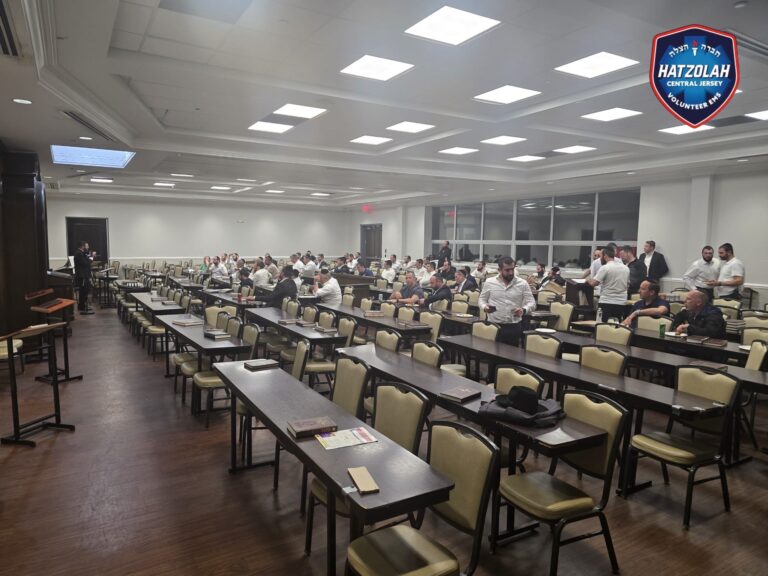 Dr. Chaim Waxman, Professor Emeritus of Sociology and Jewish Studies at Rutgers University and Chairman of Behavioral Science at Hadassah College, delivered an electrifying presentation at the Center for Kehillah Development in which he revealed new findings that Orthodox drop- out rates are falling and retention rates are rising. “Increasingly, Orthodox Jews are choosing to remain Orthodox,” he told the crowd of avreichim at the CKD. After a decade of dire alarms over Orthodox drop-outs, trends have changed and Orthodoxy now has the highest retention rate of any denomination, followed by the Reform and then the Conservative.
Dr. Chaim Waxman, Professor Emeritus of Sociology and Jewish Studies at Rutgers University and Chairman of Behavioral Science at Hadassah College, delivered an electrifying presentation at the Center for Kehillah Development in which he revealed new findings that Orthodox drop- out rates are falling and retention rates are rising. “Increasingly, Orthodox Jews are choosing to remain Orthodox,” he told the crowd of avreichim at the CKD. After a decade of dire alarms over Orthodox drop-outs, trends have changed and Orthodoxy now has the highest retention rate of any denomination, followed by the Reform and then the Conservative.

Describing Orthodoxy as the most vibrant of the movements, Dr. Waxman said that the Orthodox community is going to increase in size dramatically in coming years for many reasons. “It is not just that more Orthodox are remaining Orthodox,” he explained, “It is also that Orthodox birthrates far outpace those of every other Jewish denomination.” His research indicates that Chassidishe Jew have 12 times as many children as the non-Orthodox, and even the Modern Orthodox have 4 times the number of children as the non-Orthodox. “They are a community on the rise,” Dr. Waxman observed.

According to Rabbi Leib Kelemen, founder of the CKD, this sudden growth in Orthodoxy requires urgent action. “Read the handwriting on the wall,” he said. “Unless we help talmidei chochomim who haven’t yet taken leadership positions increase their knowledge of psak and communal leadership skills, the existing rabbonim could be overwhelmed by their growing communities and the growing number of new communities.” Rabbi Kelemen said that some rabbonim already feel challenged to give enough personal attention to every member of their kehillos, and the ongoing Orthodox success-story could make instances like these more common. Rabbi Kelemen also warned that the need for a lot of rabbonim could tempt us to place people with weaker backgrounds into rabbinic positions, while the responsible strategy would be to help the biggest talmidei chochomim get the background and skills they need to assume communal leadership. “We have giants in Torah who have tremendous maalos and beautiful middos,” Rabbi Kelemen said, “and many would be excited to take responsibility for the Klal.” This is precisely the mission CKD has accepted – in Rabbi Kelemen’s words: “To give chashuve avreichim the time and training they need to become quality leaders.” Rabbi Kelemen said that CKD is currently accepting applications for their five-year learning fellowship, and he encourages qualified talmidei chochomim to apply at www.c4kd.org.

Dr. Waxman also shared data suggesting that the yeshivishe world is not just among the fastest growing, but also in some ways the most spiritually strong. When asked, “How important is religion in your life?”, 82.8 percent of the Ultra-Orthodox said “Very Important compared to 77.4 percent of Modern Orthodox 44.3 percent of the Conservative, and only 17.2 percent of the Reform. When asked “How certain are you about your belief in God?”, 91.9 percent of the Ultra-Orthodox answered “Absolutely Certain,” compared to 87.4 percent of the Modern Orthodox, 47.5 percent of the Conservative, and 39.6 percent of the Reform.
In an astounding projection, Dr. Waxman indicated that current data suggest the possibility that the majority of all Jews in the world will live in Israel within less than 20 years. If that were realized it would be the first time this has happened since the destruction of Bayis Sheni. He pointed out that this could have major repercussions in halachah.

Dr. Waxman concluded his talk to the CKD avreichim by encouraging them to remain aware of trends in Jewish sociology: “You are going to lead Jewish communities, and in that role you will need to know what is happening both inside and outside the Orthodox community.”











One Response
Professor Waxman’s expectations are the opposite of mine, i.e., I see the economic pressures – the material costs of living frum – on frum life as a serious threat to the future of Orthodoxy. Admittedly, he has credentials that indicate he knows how to analyze these issues, and he has studied the matters in depth, and I hope he is right. But when I hear about frum families with no money to send their kids to secular colleges, to acquire the life skills and knowledge to earn the kind of money it takes to put 4 or more kids through yeshivas, I wonder about the foundations of Prof. Waxman’s optimism.
And if he is right about retention rates among the Orthodox, their children should have the strength to attend secular colleges and engage the non-frum world in business, science, medicine, law, finance and other learned professions. Yet many rabbis warn against the kind of world engagement that will provide the economic wherewithal for the coming generation of Orthodox young adults.
As I say, I hope he is right, but I am not so sure about it, and I see lots of reasons why he might be wrong.